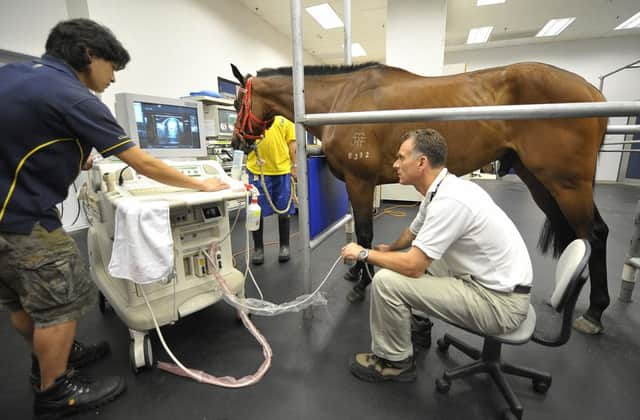Horses show symptoms similar to Alzheimer’s


The findings, the first study to a possible link between two unrelated diseases in animals and people, shed new light on the causes of the rare but predominately fatal horse condition and could help to develop new tools for diagnosing the illness.
Scientists say that horses affected by the disease – called equine grass sickness – could also hold clues to human conditions.
Advertisement
Hide AdAdvertisement
Hide AdGrass sickness attacks nerve cells in horses but the causes of the disease are unknown.
It causes gastric upset and muscle tremor and can kill within days. If diagnosed quickly, animals can sometimes be nursed back to health.
Researchers from the University of Edinburgh’s Roslin Institute and Royal (Dick) School of Veterinary Studies looked at nerve tissue from six horses that had died from equine grass sickness in a bid to investigate the causes of the condition. The horses’ owners gave their consent allowing vets to take samples.
They found that the horse tissue contained proteins that are commonly seen in the brains of people with Alzheimer’s disease – such as the build-up of amyloid protein.
In total, 506 different proteins were found to be altered in nerve tissue from horses with grass sickness, compared to animals that had died from other causes.
This knowledge could help to develop tests for detecting the condition in horses, which can be tricky to diagnose.
Around 2 per cent of horses die from grass sickness each year in the UK. The disease occurs almost exclusively in grass-fed animals, including ponies and donkeys.
A similar condition is thought to affect cats, dogs, hares, rabbits, llamas and possibly sheep.
Advertisement
Hide AdAdvertisement
Hide AdDr Tom Wishart, from the Roslin Institute, who led the study, said: “This is the first study to show similarities between an apparently unrelated neurodegenerative disease of large animals and human neurological conditions. This is not to say these horses had Alzheimer’s in any way, what we did was look at the role of proteins. Although the causes of these conditions are unlikely to be shared, the findings suggest that similar mechanisms could be involved in the later stages of disease.
“This is quite a rare condition and no-one had done this research at molecular level before.
“We were surprised that we saw so many overlaps with the characteristic seen in regenerative diseases in humans.”
Dr Wishart added: “People doing research trying to find a therapy to target the proteins involved in the human disease may be able to re-task them to horses.”
The study is published in the journal Molecular and Cellular Proteomics.
Roly Edwards, chief executive of the World Horse Welfare, international horse charity said: “Equine grass sickness is a horrific disease and we warmly welcome the University of Edinburgh’s continued commitment to research into a 100-plus year old condition that we still know so little about.
“The similarities found with Alzheimer’s are certainly intriguing.
“Once a horse develops EGS their prognosis is very guarded so we hope these findings can also inform the work being undertaken to protect horses from this vile disease, including through the ongoing vaccination trial.”